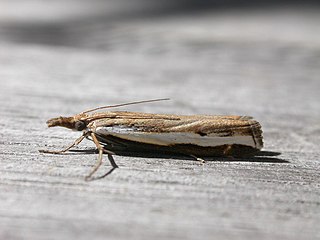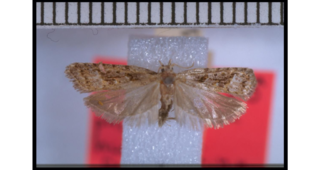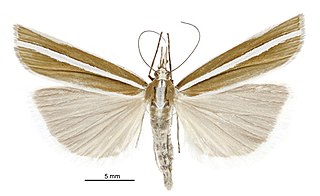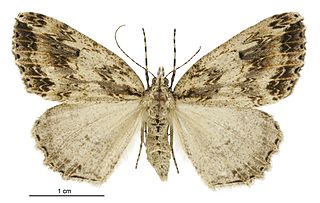
Heloxycanus patricki, also known as the sphagnum porina moth, is a species of moth of the family Hepialidae, the ghost moths. It is the only member of the genus Heloxycanus. This species is endemic to New Zealand. It has been classified as having the status of "At Risk, Declining" by the Department of Conservation.

Orocrambus is a genus of moths of the family Crambidae. All species are endemic to New Zealand.

Ecclitica is a genus of moths belonging to the subfamily Tortricinae of the family Tortricidae.

Parienia is a genus of moths belonging to the subfamily Olethreutinae of the family Tortricidae. This genus was described by Edward Meyrick in 1881. It consists of only one species, Parienia mochlophorana, which is endemic to New Zealand.
Houdinia is a monotypic genus of moths in the family Batrachedridae. Its sole species, Houdinia flexilissima, is endemic to raised bogs in northern New Zealand. It is classified as "At Risk, Relict" by the Department of Conservation. The caterpillars are sometimes referred to as Fred the thread.

Eudonia bisinualis is a species of moth in the family Crambidae. It was described by George Vernon Hudson in 1928. This species is endemic to New Zealand.

Heterocrossa philpotti is a species of moth of the family Carposinidae. It is endemic to New Zealand. It currently has two subspecies, although it has been hypothesised that Hetercrossa philpotti hudsoni may have two different species confused within this subspecies name.

Heterocrossa epomiana is a species moth in the family Carposinidae. It is endemic to New Zealand and has been observed in Westland. Adults are on the wing in January. This species is visually very similar to H. gonosemana and to H. philpotti.

Heterocrossa gonosemana is a species of moth in the family Carposinidae. It is endemic to New Zealand and is found throughout the country. It inhabits native forest. Larvae feed on seeds and fruit of Griselinia lucida and possibly Griselinia littoralis. They can be extremely active when disturbed. This species overwinters as a pupa, enclosed in a cocoon, underneath its host plant. Adults are on the wing from November until February and can be found during the day resting on lichen covered tree trunks where they are well camouflaged. The adult is nocturnal and is attracted to light.

Aoraia lenis is a species of moth of the family Hepialidae. It is endemic to New Zealand. It was described by John S. Dugdale in 1994.

Stathmopoda horticola, the orchard featherfoot, is a species of moth in the Stathmopodidae family. It was described by John S. Dugdale in 1988. It is endemic to New Zealand.

Heterocrossa is a genus of moths in the Carposinidae family. It is endemic to New Zealand. This genus was previously regarded as a synonym of the genus Carposina. However Elwood C. Zimmerman in Insects of Hawaii removed Heterocrossa from synonymy with Carposina. Zimmerman argued that as the genitalia of Heterocrossa and Carposina are distinct, Heterocrossa should not be regarded as a synonym of Carposina. This was agreed with by John S. Dugdale in his annotated catalogue of New Zealand Lepidoptera.

Ecclitica torogramma, also known as the ponga ugly nestmaker, is a species of moth of the family Tortricidae. It is endemic to New Zealand.

Ecclitica triorthota, also known as the kātote ugly nestmaker, is a species of moth of the family Tortricidae. It is found in New Zealand.

Orocrambus philpotti is a moth in the family Crambidae. It was described by David E. Gaskin in 1975. It is endemic to New Zealand, where it has been recorded in the Tasman Mountains to Lake Tekapo in the South Island. The habitat this species prefers consists of alpine and subalpine tussock grasslands.

Asaphodes beata is a species of moth in the family Geometridae. It is endemic to New Zealand and is a relatively common species that can be found throughout the country in native forest or scrub habitat. It can be distinguished from its close relative Asaphodes adonis by the colour of its hind wings. The larvae of this species feeds on watercress but tends to be inactive during the day. If threatened it will mimic a twig dropping to the ground. The adult moths are on the wing from October to March and are said to be attracted to white rātā. The white markings on the forewing of the adults are variable in appearance.

Asaphodes philpotti is a moth in the family Geometridae. It is endemic to New Zealand and has been found in the South Island as well as one observation in Wainuiomata in the North Island. This species inhabits native forest and larvae are hosted by species in the genera Hydrocotyle and Cardamine.

Dasyuris anceps is a species of moth in the family Geometridae. It is endemic to New Zealand.

Pseudocoremia rudisata is a species of moth in the family Geometridae. It is endemic to New Zealand.

Chrysorthenches is a genus of moths of the family Plutellidae.



















